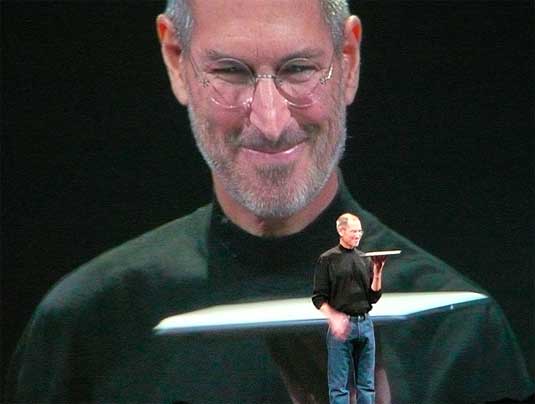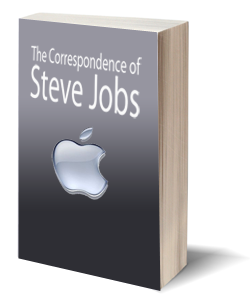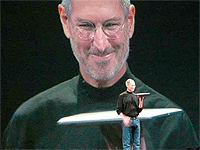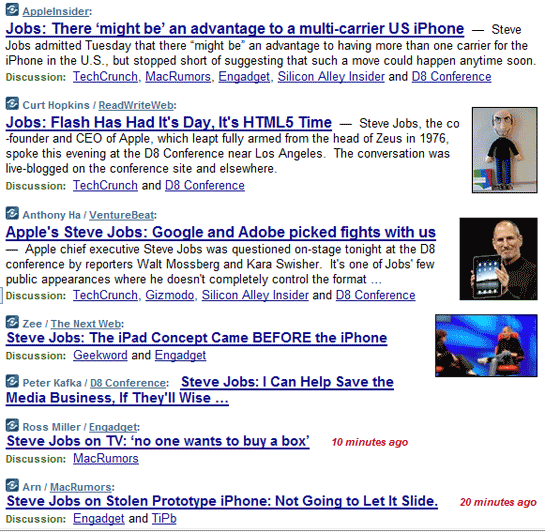The news that Steve Jobs will take another medical leave inspired scads of Apple-history timelines. This one by Marketplace’s Matt Berger, which plots major Apple product rollouts alongside the company’s stock price over the past thirty years, is one of the best.
Tag Archives | Steve Jobs
Steve Jobs Takes Another Medical Leave

Steve Jobs with the original MacBook Air in 2008
Apple CEO and cofounder Steve Jobs is going on medical leave for an unspecified length of time. Jobs, who was diagnosed with pancreatic cancer in 2004, went on a previous leave two years ago, during which he had a liver transplant, and returned in June of 2009. As before, Apple COO Tim Cook (who represented the company at last week’s Verizon iPhone event) will be in charge of day-to-day operations in Jobs’ absence.
During Jobs’ 2009 leave, a high percentage of of the tech pundits who speculated about the upshot mostly proved that it’s a lousy idea for techies to try and play medical expert.
One comment
Steve Jobs: There Is No iPhone Antennagate

(Photo borrowed from Engadget’s live coverage.)
So much for the theory that Apple was going to announce a miracle cure for iPhone 4 reception issues this morning. At the press conference on Apple’s campus, Steve Jobs offered several measures to make current and prospective iPhone 4 owners comfortable with their purchase–but he defended the iPhone 4 against charges that it has unique problems with reception, and didn’t say that Apple could or would eliminate the possibility that holding the iPhone 4 by the lower left-hand corner would hurt its performance.
Jobs showed the results of Apple’s tests of other smartphones–the BlackBerry 9700, the Droid Eris, and the Samsung Omnia II–indicating that their signal strength also drops when they’re held.
He then quoted stats that suggest most users aren’t encountering crippling new reception issues. Only .55 percent of iPhone 4 buyers have called AppleCare with antenna- or reception-related problems; just 1.7 percent of people who bought iPhone 4s from AT&T have returned them (with the iPhone 3GS, it was six percent). According to AT&T, the iPhone 4 drops calls more frequently than the iPhone 3GS–but only by one additional dropped call per 100 calls.
Jobs shared a pet theory: Because the iPhone 4 has a new shape that requires new cases, only twenty percent of buyers leave the Apple Store with a case, versus eighty percent of iPhone 3GS buyers who did. Since it’s using the iPhone 4 without a case that reveals the reception issue, it may just be that more iPhone 4 owners have been exposed to troublesome reception scenarios.
And then he explained how Apple would respond to the iPhone 4 issue:
- He recommended that all iPhone 4 users upgrade to iOS 4.0.1, which provides a more accurate depiction of signal strength;
- Apple will provide a free iPhone 4 case–Apple’s bumper or another model, since there aren’t enough bumpers to go around–to everyone who has bought a phone or will buy one between now and September 30th;
- Customers who are still unhappy can bring their iPhone 4 back within thirty days for a full refund, with no restocking fee;
- Apple is looking into the issues that have been reported with the iPhone 4’s proximity sensor, and hopes to fix them in the next software update;
- By the end of this month, the white iPhone 4 will be shipping and the iPhone 4 will be available in another seventeen countries.
During the Q&A that followed–which is still going on as I write this–Jobs said that Apple doesn’t have a better antenna design (maybe the next iPhone will have one, he said) and that a Bloomberg story which said an Apple engineer had warned him about the iPhone 4 antenna was “bullshit.”
Throughout, Jobs talked about how hard Apple works to make its customers happy, and how much it loves those customers. He said that Apple isn’t perfect, and didn’t deny that the iPhone 4’s antenna design can cause problems.
So does this end controversy over the iPhone 4? No, I don’t think that anyone, including Jobs, believes that. But it may put the final verdict in the hands of iPhone 4 owners rather than the media or Apple. If millions of people buy the iPhone 4 and don’t encounter any unique reception difficulties, they’ll tell their friends and the phone’s rep will quickly heal. And if those millions of people do find the phone unreliable, they’ll tell their friends that, too.
(Me, I’ve found that my iPhone 4 seems to have good-to-very-good reception in most instances–except when I entered a zone of weak AT&T signal and found that how I held the phone made a huge difference.)
More thoughts to come, but here’s one aspect of all this that cries out for further exploration. In today’s press conference, Jobs showed other phones suffering from reception issues that looked a lot like those that the iPhone 4 can encounter. But when Consumer Reports decided not to recommend the phone, it did so based on tests of the iPhone 4 and other phones which indicated that the 4 has problems that other phones don’t. The “other phones” involved were different, so the conclusions weren’t inconsistent. But I’d like to see CR or another third party with the resources and know-how perform further testing of this sort.
So if you followed the press conference this morning, what’s your take on Apple’s response? Do you think the company is done addressing this?
5 comments
Steve Jobs at D: The Headlines
I wasn’t in the audience for Steve Jobs’ appearance at the Wall Street Journal’s D conference this evening. I wasn’t even following along at home–I was having fun being part of a panel on social media for business in Palo Alto. So once my panel and subsequent hobnobbing were over, I hopped online to see what Jobs had to say–and even more than usual, the headlines on Techmeme neatly summarized the news.
You could read all these stories, but even if you didn’t, you’d get the gist of the Jobs interview with Walt Mossberg and Kara Swisher:
3 comments
Steve Jobs's Cogent Flash Takedown Needs a Response From Adobe
Why won’t Apple allow Flash on the iPhone and iPad? If you want to read all the reasons all in one place, check out this post. It’s by a guy who knows what he’s talking about: Steve Jobs.
The reasons, as he states them:
- Flash is closed, and Web technologies should be open
- Most of the video people really want to watch is available in iPhone/iPad-compatible HTML5 anyhow
- With 50,000 games for the iPhone and iPad, who cares if they won’t play Flash games?
- Flash is too unreliable and insecure
- Flash for mobile devices has been delayed too often
- Flash kills battery life
- Flash was never designed for touch interfaces
- Flash is an additional layer that lets developers create cross-platform apps, but at the expense of building apps that truly leverage the platforms they run on
It’s easy to poke holes in certain parts of Jobs’ arguments–for instance, he says that “iPhone, iPod and iPod users aren’t missing much video,” which will be news to anyone who’s traveled around the Web on an Apple mobile device and found more giant empty blocks than video players. And lots of people–me included–would rather have the opportunity to choose for themselves whether to use Flash and Flash content on their mobile gadgets. (It’s possible to opt for a Flash-free PC or Mac; hardly anyone does.)
Overall, though, Jobs’s piece is pretty cogent. I came away from it feeling that Apple’s stance on Flash is controlling–but not nefarious. It’s the latest in a long list of instances of Apple getting to the future a little ahead of everyone else, in ways that are problematic at first but work out okay in the long run.
I hope that Adobe responds. The company has some good bloggers, including Mike Chambers and John Nack. Unfortunately, though, the most prominent Adobe employee who blogs about Flash is an evangelist named Lee Brimelow who seems to specialize in being kinda childish. His blog is called The Flash Blog, and has included a rant that ended “Go screw yourself, Apple” and another post which seems to criticize the iPad for not supporting Flash-based porn. I get why an Adobe staffer–especially one charged with being passionate about Flash–might be irate about all this. But Brimelow isn’t the guy to take on Steve Jobs directly.
Brimelow says that The Flash Blog isn’t the official Adobe Flash blog. Given his position with the company and the blog’s title–and the fact there isn’t an official Flash blog as far as I can tell–I understand why people might be confused.
There’s a case to be made for Flash on Apple platforms, and Adobe ought to make it–calmly, coherently, and soon. Even if it’s a lost cause. Which it is…
33 comments
The Correspondence of Steve Jobs
 I’m not sure exactly how it happened, but an awful lot of people have decided that it’s reasonable to treat Steve Jobs as a one-man Genius Bar–and Jobs seems to be okay with the idea.
I’m not sure exactly how it happened, but an awful lot of people have decided that it’s reasonable to treat Steve Jobs as a one-man Genius Bar–and Jobs seems to be okay with the idea.
In March and April, he he has apparently answered a question about iPhone e-mail plans, said there are no plans to let iPhones tether with iPads, bucked up a worried Mac fan, criticized Google Picasa, talked up YouTube as a Blu-Ray alternative, clarified the iPad’s international shipping schedule (and bristled at a theory that a conspiracy was behind delays), confirmed that the original iPhone was toast, defended changes to iPhone software-development policies, and more–all with messages between one and twenty-four words in length.
Jobs’ correspondence with consumers first made news back in 1998, when he prankishly informed an Apple devotee who’d been waging a quixotic campaign to be named as Apple’s CEO that the fan had gotten the gig. The Apple cofounder, who was still calling himself the company’s interim CEO at that point, came off poorly. Whether intentionally or not, he’s long since paid his penance by engaging in a dialog with Apple customers that seems quite sincere, even though it’s remarkably terse–and occasionally downright irritable. And in recent weeks, either he’s picked up the pace or an unusually high percentage of receipients of Stevemail have gone public.
We don’t know much about these messages. It’s been theorized that assistants are involved–to help identify messages that need responses, at least, if not as ghostwriters–or that some are hoaxes. They certainly read like they’ll all from one particular person, and they’re fun to revisit. So here’s a selection of them. I’ve focused on mail sent prior to 2010 for which the original message as well as Jobs’ response are available. And for each dialog, I look at the aftermath of the subject at hand.
5 comments
Saving Steve Jobs
As I left Apple’s iPad launch last Wednesday, someone thrust a pamphlet into my hand. Nothing startling about that–there are often folks handing out literature outside these events, and they usually turn out to be from either small Apple-related companies or organizations that are unhappy with the company’s DRM.
This pamphlet, however, was…a religious tract. From Jews for Jesus, the quixotic organization which devoted the brochure to a particularly quixotic purpose: addressing Steve Jobs directly, comparing the noted Buddhist to Jesus Christ, and arguing that he should accept Christ as his savior.
It’s certainly not the first time certain parallels have been drawn between the co-founder of Apple and the Son of God: Googling for “Steve Jobs Messiah” returns a scary quantity of results, Apple fans have long been compared to disciples, and the iPhone and iPad have frequently been called the Jesus Phone and Jesus Tablet, respectively. But I don’t know of anyone who’s taken the idea as far as Jews for Jesus, which peppers the pamphlet with both obvious religious allusions (Adam, Eve, and the apple) and unexpected ones (telling Jobs that his “NeXTStep” should be to ask God for “a new OS.” I understand that Jobs’ firing by John Sculley represents the Crucifixion, but I’m not enough of a Biblical scholar to figure out whether it’s the founding of NeXT or Jobs’ return to Apple that parallels the Resurrection.
At first, I thought that the pamphlet was a custom job for the iPad event , but it’s several years old, as evidenced by its lack of mentions of the iPhone, let alone the iPad. (The later is a particular shame given the rich scriptural possibilities in the mere notion of Apple tablets.)
After the jump, the flyer in full (as reprinted from Jews for Jesus’s online library of PDFs). It’s the first religious document I’ve run here, and I have a hunch it’ll be the last…
3 comments
Apple Rumors: The Early Years
 We live in an, um, golden age of Apple gossip. Thanks to the blogosphere, a surging sea of sites cover an endless array of rumors about the company, from ones that are right on the money to ones that are partially right to ones that aren’t right at all. The conversation spawned by the scuttlebutt has helped many a site fill time during slow news days: No other company can set off a frenzy of speculation about matters as mundane as the quantity of USB ports a new machine might sport.
We live in an, um, golden age of Apple gossip. Thanks to the blogosphere, a surging sea of sites cover an endless array of rumors about the company, from ones that are right on the money to ones that are partially right to ones that aren’t right at all. The conversation spawned by the scuttlebutt has helped many a site fill time during slow news days: No other company can set off a frenzy of speculation about matters as mundane as the quantity of USB ports a new machine might sport.
The sheer quantity of Apple scuttlebutt has never been higher. But the company has been a powerful engine for the rumor mill for as long as there’s been an Apple and tech journalists to cover it. And Google Books’ recent addition of the entire run of InfoWorld provides us with the opportunity to revisit the first golden age of Apple rumors–which, uncoincidentally, ended when Steve Jobs was forced out of the company he cofounded in mid-1985.
Today’s InfoWorld may be a Web site for IT professionals, but in the early 1980s it was a weekly publication for microcomputer users, and its pages are as good a record as you’ll find of the era’s industry chatter–including lots and lots of stuff about Apple. So in this second installment in our once-in-awhile series on Apple rumors and predictions, we’ll check out tidbits from InfoWorld stories (1980-1985). My goal is not to mock, but simply to see what folks thought Apple would do, what they thought it meant…and whether any of it came to pass.
2 comments
Steve Jobs is Officially Back at Work
 Last week, a quote in an Apple press release was the first sign that Steve Jobs had done what he said he’d do back in January and ended his medical leave in late June. Now it’s official: Apple is saying that Jobs has returned to active duty, working a few days a week at the office and the remainder at home. It’s no surprise that the company isn’t saying much else, including discussing his liver transplant.
Last week, a quote in an Apple press release was the first sign that Steve Jobs had done what he said he’d do back in January and ended his medical leave in late June. Now it’s official: Apple is saying that Jobs has returned to active duty, working a few days a week at the office and the remainder at home. It’s no surprise that the company isn’t saying much else, including discussing his liver transplant.
Others will blog (endlessly) about Jobs’ health, how many hours a week he’s really putting in, questions of shareholder disclosure, etc., etc., etc., etc. I have only one question: When will we next see a Steve Jobs keynote? Maybe soon; maybe not so soon. And maybe never, although I have no reason to think he’s done with them, and I certainly hope he isn’t. (And I hope it’s obvious that I know his impact on Apple product development is far more important than his impact on Apple product rollouts.)
I’m a bystander, not an Apple cheerleader. But I’m in favor of the tech world being interesting, and it would be a more boring place without Jobs keynotes…
No comments
What’s in a Name? Apple Removes a Space From “iPhone 3G S”
I can’t believe I’m writing about this, but the iPhone 3G S is apparently getting a name change, three days after it showed up in stores. No, it’s not becoming the iPhone Pro or the iPhone Speedster or the iPhone Evolution. The Apple press release trumpeting the sale of a million units of the new phone calls it the iPhone 3GS–no space. And Apple seems to have gone back and tweaked the release from a couple of weeks ago announcing the phone’s imminent arrival, which originally called it the 3G S and now says it’s the 3GS.
Elsewhere on the Apple site, however, it’s still the 3G S–for now, anyhow:


